“We need to survive,” the boy kept saying. Survivors of a missile attack on Lviv realise that nowhere is safe
On 6 July 2023, between two and three in the morning, Russia carried out its largest strike on Lviv's civilian infrastructure facilities since the full-scale war started. One missile hit a residential building on Stryiska Street. Lviv resident Mirka Klos and her husband, five children and their cat survived the attack.
They managed to run out of the house after the strike and heard the last of three explosions as they were lying face down in the grass in the park across the street. "It's the biggest miracle that my whole family survived. But actually, this is just one of many Ukrainian news stories.
We're familiar with them from other cities," she says. Ten of their neighbours were killed and 50 were injured. Dozens of families lost their homes.
A few days after the missile strike, some of the survivors talked to us in the courtyard of their devastated apartment building about how they got through the attack.
Advertisement: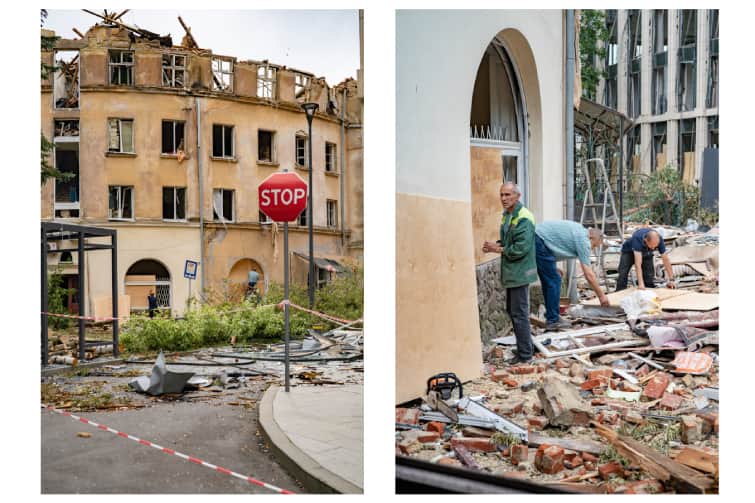
Public utilities workers and residents clear the rubble from the building
A family from No.
68
The first explosion occurred at 02:30. Mirka Klos heard the sound of a motor revving up very very fast. Through the window she saw a blue flash.
There was a painting near the window, and it flew into the middle of the room, its glass shattering. "The family was in the hall at the time - the children were sleeping on makeshift beds on the floor. Going down to the shelter was complicated for us.
Our fifth child had just turned one," says Mirka. "That's why we had the two-walls principle [a safety rule whereby you keep two walls without windows between you and the street during attacks - ed.]." Before she even had time to gather the children together, Mirka heard and felt the next blast. The apartment shook.
It was clear that this time the missile had hit their building. Smoke was pouring out of the ventilation duct, and there was a smell of gas.
Advertisement:"This is bad, it's really bad. Let's get out," Ihor, her husband, said.
The younger children were screaming, and seven-year-old Marko kept repeating: "The main thing is to survive. We have to survive."
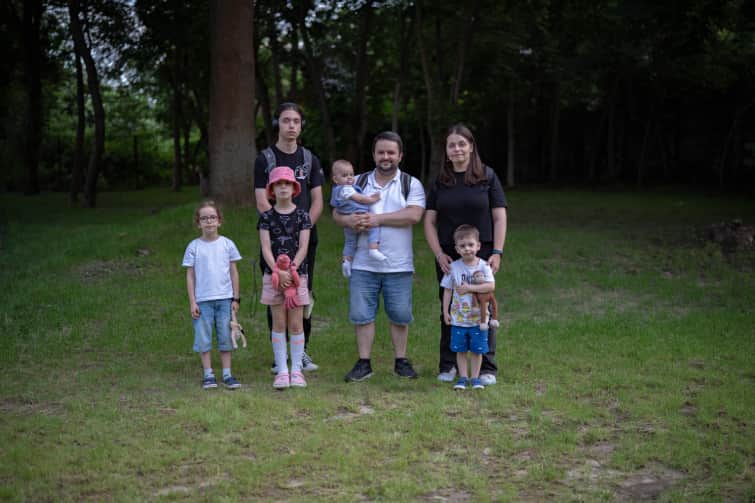
Mirka Klos, her husband and children were here when the third explosion happened The door to their apartment was jammed, and as their neighbours tried to open it from the outside, Mirka, 36, thought these might be their last moments as a family.
When they finally managed to get the door open, they all went down from the third floor into the yard, which, at half past two in the morning on 6 July, had been transformed. Instead of greenery, softly lit by lamplight, everything was grey. Grey trees, grey cars.
"As if sprinkled with powder," Mirka thought. She managed to spot their car: it was smashed to pieces. Then someone nearby shouted, "Run to the park, it's the third strike!"
They were lying face down in the grass in Stryiskyi Park across the street when they heard the third explosion. This strike, like the first one, did not hit the house, but landed somewhere else in their neighbourhood. When Mirka looked up, she was surprised to see that one of her sons was wearing his glasses. "Where did you get them?" she asked.
Her son replied: "You gave them to me." She had no memory of thinking about the glasses as she fled the apartment. Then she began to panic and count the children as if she might have forgotten someone. They were all there.
Their cat was there too, in a bag. Mirka realised that she had even grabbed a box from the apartment that contained her favourite corals and her unique zgarda [an ancient type of Hutsul necklace from the Carpathians in Ukraine's west - ed.]. Now that the full-scale war was into its second year, they no longer kept a suitcase packed and ready, but a red folder containing their passports was always at hand.
She managed to take a photo of the yard after the strike. That was during the brief interval between strikes: here they are in their pyjamas, cautiously stepping on the layer of broken glass in the entrance, going out into the yard - click! - and already running away to the park. "I realised that I might get killed now.
And someone will need this photo. As a historical fact," says Mirka. Posted on Facebook, the photograph was one of the first pieces of evidence that a Russian Kalibr cruise missile had struck the four-storey apartment building at 50-76B Stryiska Street.
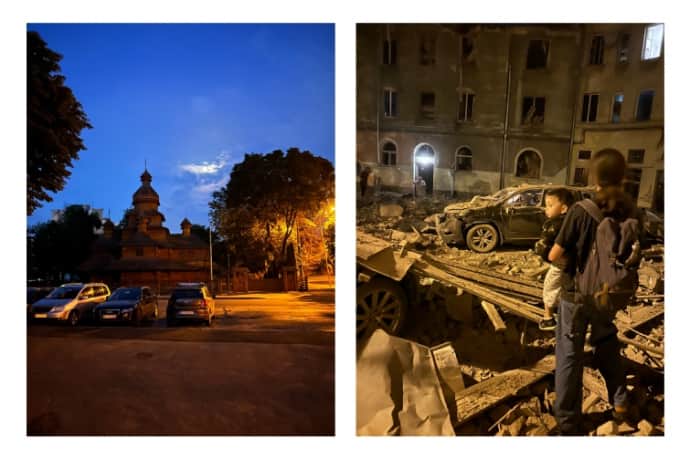
Photos taken by Mirka Klos after the Russian missile hit her home.
The photos show the family's destroyed car, their elder and younger sons, and dawn breaking after the blast
Ten portraits
The missile attack took place on the night of Wednesday to Thursday. On Friday morning, search and rescue workers pulled out the tenth and last person to have been killed. The attack hit No.
64, the corner house, and the adjacent one, No.
66. Nine people died in No.
64, and the tenth victim died in No.
66. Mirka's family's apartment at No.
68 was one of the luckier ones. The windows were smashed, everything inside was covered in glass, but the walls were intact. The building is called a "horseshoe" due to its quadrangular shape with smoothly cut corners - a classic of 1930s Polish modernism.
It's actually a row of houses standing right next to each other with a single entrance. The Horseshoe was built for the lecturers of Lviv Polytechnic. And after World War II, when Lviv was taken over by the USSR, other residents moved in - prominent Soviet figures.
Today, the building is home to the grandchildren and great-grandchildren of those people, and other tenants, such as Mirka and Ihor Klos and their five children. They bought their apartment, which overlooks Stryiskyi Park, four years ago. Although there was clearly not enough space for everyone in the two-bedroom flat, Mirka loved her home - she "chose every tile herself".
Advertisement:"We would have loved to rent an apartment in that building", several friends of mine said after the attack.
Indeed, there's a park just across the street, the Ukrainian Catholic University is five minutes away, and it's a short bus ride to a large shopping centre. The location was attractive to potential tenants, and there was no longer enough space to park in the gated yard. "We used to have ?ar wars here," Mirka says.
The residents had installed a barrier at the entrance only a week before the attack. Now all the cars that were parked in the yard have been destroyed.
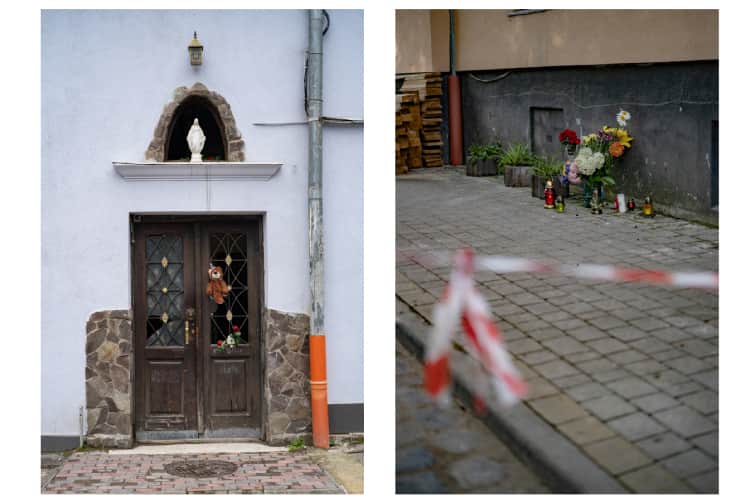 Impromptu shrines in memory of those who lost their lives at the site of the attack on the second day of mourning
Impromptu shrines in memory of those who lost their lives at the site of the attack on the second day of mourning
When I arrive here on Friday, the second day after the missile attack, the yard has already been cleared of debris. Only the flowerbeds that were well-kept the day before yesterday are now trampled on: tents for doctors and the State Emergency Service have been set up on them, and volunteers are giving out clothes in another corner of the courtyard.
The volunteers ask a resident: "Do you live here?" "No, I don't, everything's covered in soot." That's how you identify the residents: their feet are covered in soot, their T-shirts in grey dust. They are working like ants, taking out rubbish from their apartments. "The only thing that survived is a stainless steel kettle", says a man from No.
76, forgetting to add "and the apartment". There are intact apartments at the opposite end of the Horseshoe, and the coffee shop on the corner of the building furthest from the blast's epicentre was open on the first day after the attack.
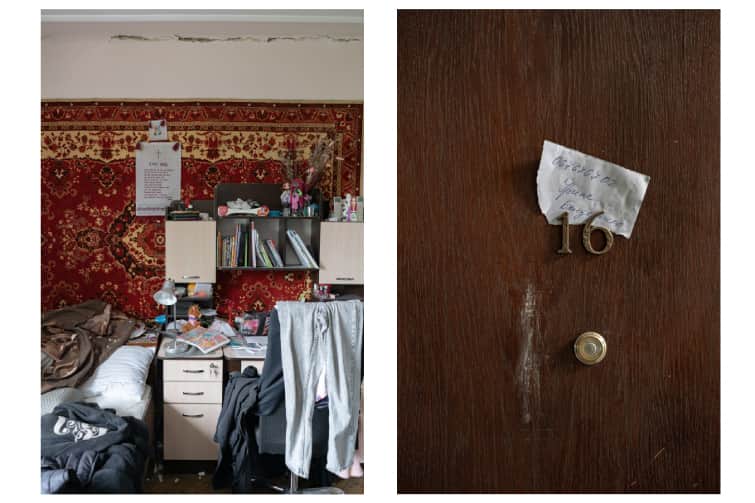 Residents of the ruined houses leave their contact details on their doors, which can't be shut due to damage to the doorframes caused by the blast wave.
Residents of the ruined houses leave their contact details on their doors, which can't be shut due to damage to the doorframes caused by the blast wave.
The deputy chairman of the housing cooperative sends any non-residents away: "People are already doing tours here!" But other than journalists, there are only a few strangers here. They've come here because they felt involved.
Here is a man in clean clothes standing in silence, with tears in his eyes. "Do you live here?" "No, no. I want to share my pension."
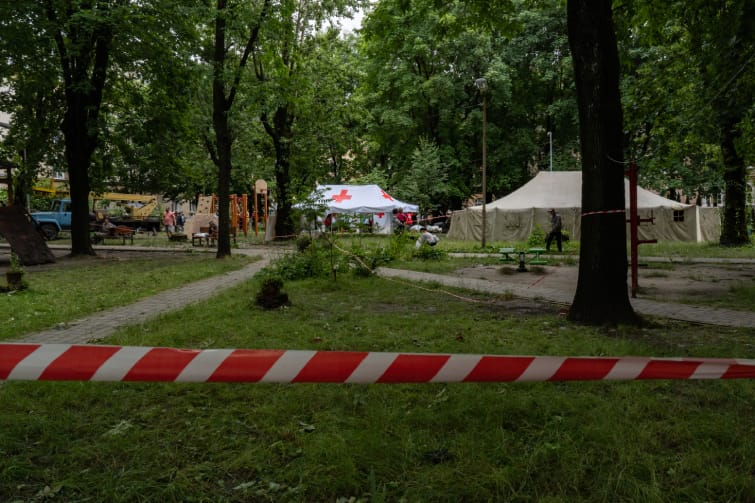 The yard of the building
The yard of the building
A dazed-looking lady with a stylish haircut stands in the middle of the yard. She's come to say goodbye: "My friend lived here.
I had my hair cut by her for 28 years. She did this haircut." A sign has been put up in the yard with the names of the victims and portraits of them - black-and-white photographs in which everyone looks younger.
Nadiia Spizhevska, 56. Myroslava Sadova, 59. Anastasiia Seniv, 32.
Inna Yanishevska, 54. Olha Dutka, 65. Svitlana Pikh, 70.
Olha Tatarinova, 68. Valerii Riabtsev, 67. Iryna Milovanova, 62.
Mykhailo Yelisieiev, 35. Two women in their 60s stop in front of the photos. "Look, it's Olechka, such a lovely lady. Always so neatly turned-out.
Do you remember when we used to play in the yard together?"
"Mum, you're covered in blood!"
"Some foam is rustling but it's very loud, and the sound seems to go right through you." "A whistling noise, and then it's as if a huge truck is driving into a pit of water, it pulls it in, then lets it go." "It felt as if the missile was right here on my forehead.
This terrifying humming turned into an explosion with flames." This is how people who lived in and around the house on Stryiska Street describe the missile strike.
Advertisement:68-year-old Mariia Chmyr from No.
66 was very close to the impact site. She didn't hear the air-raid siren or the sound of the missile.
Probably a thunderstorm, she thought when she heard the rumbling. But a moment later she realised that it was an explosion and managed to jump out into the hallway. "I was thrown out and against the wall opposite.
And my daughter shouted: 'Mum, you're covered in blood!'"
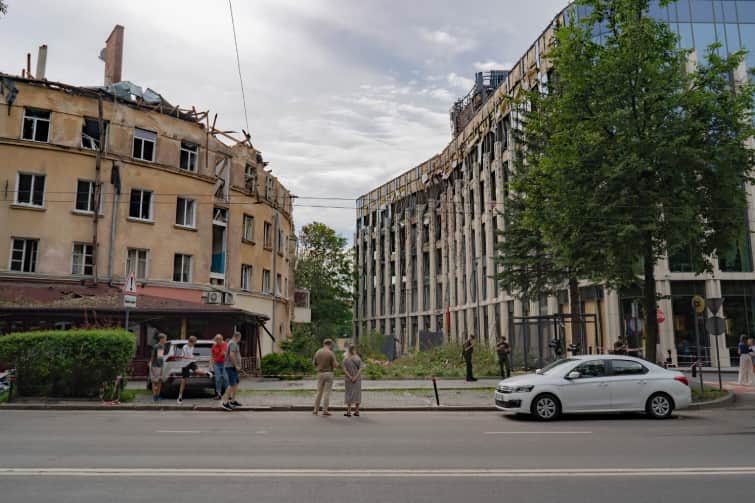 The ruined section of the building and the side of an office block
The ruined section of the building and the side of an office block
The apartment was filled with either dust or smoke. Mariia, her daughter and her husband, who recently suffered a stroke, came to their senses and groped their way out. The front door was jammed.
But looking out of a broken window, Mariia spotted some rescue workers: "They ran up to the second floor and let us out!" Mariia's back was slashed with shards of debris and she had glass stuck in the back of her head. Medics washed her wounds in the yard.
She did not know then that a lady who lived two floors above her had been trapped under the collapsed ceilings.
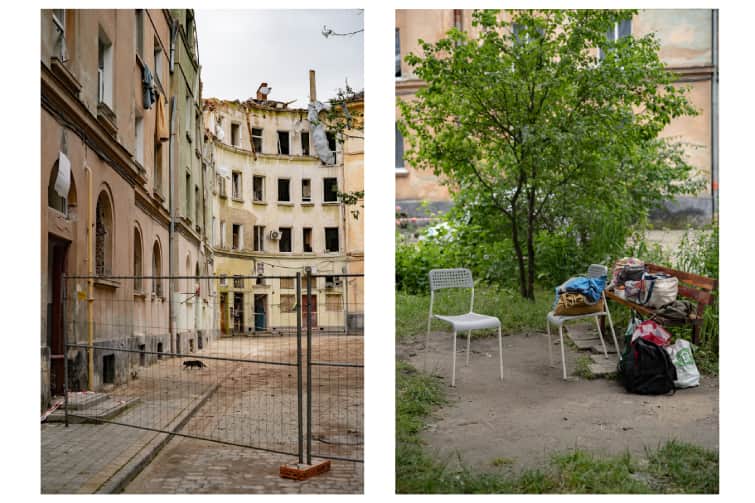 The ruined section of the building from the yard, and belongings from a destroyed apartment that the occupant managed to retrieve
The ruined section of the building from the yard, and belongings from a destroyed apartment that the occupant managed to retrieve
Listening to these people, it's hard not to ask why they didn't go to the shelter after hearing the air-raid siren. But the question is a hasty one. Every person who has been woken up by the air-raid siren at least once in the dead of night knows the answer.
You choose sleep. You think: there's a chance it might hit you, but it's not as high as the chance of not getting enough sleep, even if your area has already been hit - and there was a drone strike not far from the house on Stryiska Street a few weeks before. Mirka Klos has a vivid image to explain this deceptive sense of security - she's a theatre critic by training.
"We're like boiled frogs in Lviv," she says. "If you throw a frog into boiling water, it jumps out in shock. But we were heated up gradually." Yuliia Koval from No.
76 - it was her husband who was talking about the kettle surviving - answers: "MiGs [Soviet-designed twin-engine fighter aircraft - ed.] were flying in Belarus, and we thought: oh, it's somewhere over there." We relaxed. Nevertheless, Yuliia did run to shelter in the nearby entrance after the missile hit. And when she went upstairs after the all-clear, she saw the sky where the third and fourth floors of the opposite corner of the building had been.
And then some people nearby said: they've found the first person. Then two more. Mother and daughter.
More terrible news
After the all-clear, Mirka returned to the house with her husband and eldest son.
An ambulance, a fire engine, and dozens of cars she'd never seen before in her life had already arrived. All the residents we were able to talk to said rescue workers were on the scene very quickly. People were not allowed into their apartments until the evening.
Mirka's husband was permitted to pop back for a short time to cover their windows with cling film against the rain. "Now the children ask me: 'Are we homeless? Are we refugees?' And I say, 'Maybe we are kind of like refugees'." Mirka didn't want to be a real refugee in another country, although, with five children under 18, the whole family could have fled abroad.
Her husband is an IT specialist; he was offered the chance to relocate. They even had a choice of Poland or Spain.
Advertisement:But Mirka resisted. They went to her hometown in Lviv Oblast for a while, but then returned to Lviv.
Their youngest was born during the invasion. Despite everything, Lviv seemed a fairly safe city to her. After all, it was here that the internally displaced were coming to save themselves.
Lviv was a city where people wanted to live. And her favourite place is here - Stryiskyi Park across the street from the house. "We know that park with our eyes closed," says Mirka.
Two years ago, she published a book of short stories, Walks in Stryiskyi Park. "I want my children to grow up Ukrainian. Would I be able to provide that for them in Poland, Spain, or America?
I don't want to grow roots in a foreign country; I don't want to root my children in foreign soil," Mirka adds.
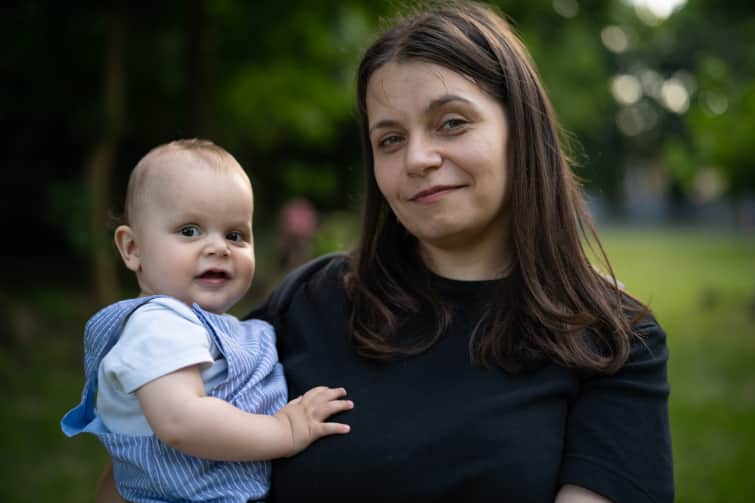 Mirka Klos with her youngest child
Mirka Klos with her youngest child
But since the strike, she is no longer sure that it's worth staying in Lviv. The family are now living with friends and looking for a place to rent. Friends have been fundraising to help them.
The building is in a state of emergency, so it is not yet clear whether they will be able to continue living in it. The city rehoused those who lost their apartments and had nowhere to go in a modular town in Stryiskyi Park and in a hotel. Most people chose to spend the first night in the modular town - it was closer to home.
Internally displaced people used to live in these containers. The city authorities plan to compensate residents for the value of their damaged property and rental costs for the duration of repairs to their building. UAH 100 million has been allocated from the budget for this purpose.
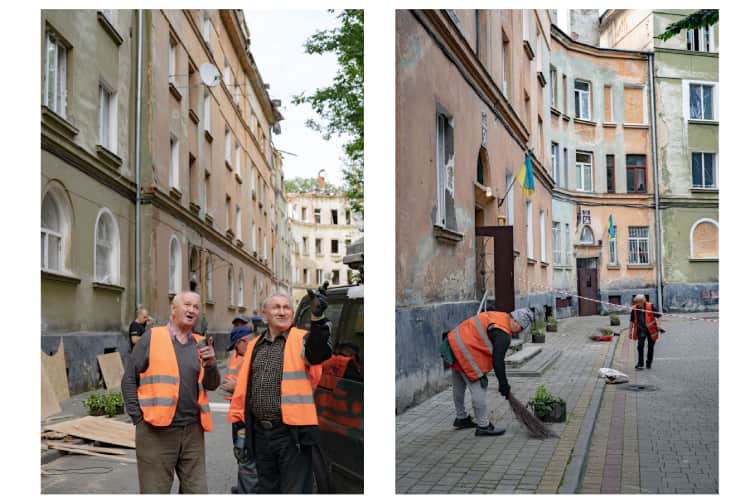 Utility workers repair the interior of the building after the attack
Utility workers repair the interior of the building after the attack
As we talk with Mirka, sitting on a bench in the yard, municipal utility workers are dismantling the roof that was damaged in the attack.
A heavy terracotta tile falls into the back of the truck: bang! bang! Mirka talks about survivor's guilt. She says that she and her friends in Lviv suffer from this syndrome.
Maybe even children do too. "I'm sorry this happened," a 10-year-old child wrote on their drawing on one of the impromptu memorials in the yard. Now Mirka Klos from Lviv feels as if this attack has brought her closer to a woman from, say, Saltivka in Kharkiv Oblast.
Images from the news - a bombed-out apartment block in Dnipro, other shelled houses - have become a reality for her as well. She recalls the poem "Tryvoha" (Alarm) by Victoria Amelina. Victoria died of injuries she sustained as a result of a Russian rocket hitting Kramatorsk.
On 5 July, people said goodbye to the writer in her hometown of Lviv. And on that very night, rockets hit Lviv as well. Here is the poem:
The air-raid alert is all over the country
Every time it's like going to an execution Everyone goes But they target only one
Mostly one who is closer It's not you today; all clear.
Svitlana Oslavska, especially for UP. Life
Photography: Anna Ilchenko. Photos from the night of the attack provided by Mirka Klos This material was created for the Life in War project with the support of the Public Interest Journalism Lab and the Institute of Humanities (Institut fur die Wissenschaften vom Menschen).
Translation: Myroslava Zavadska, Yuliia Kravchenko, Yelyzaveta Khodatska
Editing: Teresa Pearce